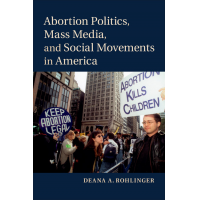 The thought of publishing a book is very seductive. A book offers the opportunity to explain ideas in detail. For some, it signifies an academic arrival. Once you publish a book, you are officially part of the knowledge production machine, you have a compelling way to engage the conversation. My book, on abortion politics [Abortion Politics, Mass Media, and Social Movements in America], was meant to be that.
The thought of publishing a book is very seductive. A book offers the opportunity to explain ideas in detail. For some, it signifies an academic arrival. Once you publish a book, you are officially part of the knowledge production machine, you have a compelling way to engage the conversation. My book, on abortion politics [Abortion Politics, Mass Media, and Social Movements in America], was meant to be that.
But this story is not about the intensity of the topic, but the intensity of the book. I love my book. I am proud of it. But the process stunned me. It took four years for my book to get published (from the initial submission to its publication) and I had almost no contact with my editor during the revision or publication process. I learned that the reality of publishing a book does not always live up to the Hollywood montage that plays out in our minds. This may sound obvious…but it surprised me.
When I am asked to give advice on writing a book, I answer: You need to be practical about your book. Here are a few things to consider when you get serious about moving a book from the montage in your mind to reality.
How your institution and department feel about books? When I arrived at Florida State University, I learned that my department was fine with my publishing a book. The provost at the time, however, was not. His part-true, part-disciplinarily parochial view was that books are just dissertations that publishers agreed to put in print, again. After I was done feeling disappointed, I realized I would have to be careful about when I published a book on the same topic as my dissertation. I didn’t want to spend years on a book that ultimately hurt (rather than helped) my career.
What are the publication expectations for promotion or just keeping your job? These vary dramatically by institution, but are important to your decision-making. If you are at an R-1, then your book might only count if it is published by a “top tier” press, which will be interpreted however the powers-that-be see fit. In this situation, you want to do the background work to figure out the prevailing definition of “top tier” and determine exactly what will make that book count. For example, some institutions want the book published and reviewed before they will count the book toward promotion. If you have more publishing leeway, think of the academic publishing universe as your proverbial oyster! There are a number of exciting academic presses that don’t have university in their title (think Routledge, Sage, Polity, and Ashgate) but are publishing great stuff. Use this opportunity to find a good fit for you.
How long can you wait to get reviews? How about for your book to come out? You can hardly believe the variability in review times for academic publishers. I waited over a year for two reviews! I made good use of the reviews, and revised the book in less than six months. Then I waited another year for the contract. Others put in this kind of time and never got that contract. For me, I actually stepped up the pace by shopping my manuscript around to other publishers and obtaining competing contracts. Be aware, getting competing contracts can be tricky business, particularly since some of the big-wig publishers do not allow you to submit your manuscript elsewhere while it is under review. I also asked a friend to contact the editor on my behalf. It was tough: The top-tier press would help me with the promotion and raise I sought. But there were otherwise very attractive features to other publishers.
Do you really want to write a book? Think hard about whether writing a book will bring you pleasure. I (half) jokingly refer to academia as the “profession of pain,” and truly believe it is critical to find pleasure in our work where we can. I really enjoyed writing my book and, despite the lingering bad taste in my mouth about the process, I am really pleased with my final product. Writing, for me, is bliss. I love to get comments and rewrite (something, by the way, that you cannot always count on an editor to do). Others have observed that I get grouchy on the days I cannot write due to other professional obligations. This isn’t true for everyone. If writing the equivalent of ten papers in a row with minimal feedback doesn’t sound appealing, you should think seriously about creating a writing plan that doesn’t look or feel like torture, or put off writing that book for now.
We are awash in books. My home and office are crowded with bookshelves packed with the fiction and nonfiction books that I’ve read and want to read. In retrospect, it is not surprising that I had a romanticized understanding of the academic publishing industry. While I am sure that I still have much to learn, I am finishing up my second sole-authored book. The process is going much better. My editor is excited about the book and, even though the deadline is looming large, so am I.
Deana A. Rohlinger is a Professor of Sociology at Florida State University. She is the author of Abortion Politics, Mass Media, and Social Movements in America (2015). Learn more about Deana’s work at www.DeanaRohlinger.com.


Comments